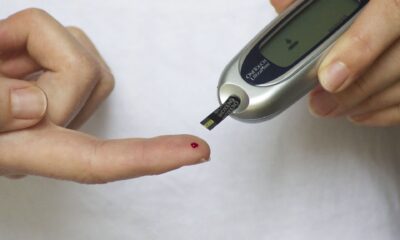
Featured Item

Use of diabetic meds to lose weight sparks furore
There’s a global shortage of injectable Schedule 4 diabetes medication because people without a serious weight problem are using it to drop those pesky kilos, leaving type 2 diabetics in a potentially life-threatening situation.
Since the weight-loss benefits went viral on social media, the supply of Ozempic, a prescription medicine for type 2 diabetes, has diminished, and the use of this drug for cosmetic purposes has sparked a massive debate on social media.
Dr Dina Gulan, an orthopaedic surgeon who suffers from type 2 diabetes, became embroiled in one of these online arguments. “I got really upset with some of these women who claim to be obese and refuse to be apologetic about using Ozempic,” she says. “Then you look at the photos of these people, and they’re not obese. This is purely lifestyle-related weight loss.”
Gulan has had a tumultuous time since the shortage began. “I had to stop taking Ozempic,” she says. “I’ve had to change my medication three times, which has definitely affected my glucose control. My bloods weren’t good a month ago, and I have to repeat them now. If they’re still problematic, that’s basically me on insulin.”
Along with diet and exercise, Ozempic is proven to improve blood sugar in those facing type 2 diabetes. It also reduces the risk of major cardiovascular events such as stroke, heart attack, or death in those suffering from this type of diabetes and heart disease. Ozempic is a GLP-1 receptor agonist, meaning it mimics the action of a hormone called glucagon-peptide 1, which regulates blood sugar levels.
“Ozempic reduces glucose through stimulating insulin secretion, lowering glucagon secretion and reducing appetite via GLP receptors at the brain,” says Dr Lana Marcus, a general practitioner whose patients include those with diabetes.
While type 2 diabetes sufferers often have to increase their medication over the years and may eventually require insulin therapy to regulate their blood sugar, it’s something doctors delay for as long as possible, using the many diabetes drugs at their disposal.
“When one of those classes of drugs becomes unavailable, doctors could be restricted to inferior choices of medication,” says Marcus. What’s more, some commonly prescribed alternatives like Trulicity, another GLP-1 receptor agonist, are now also out of stock due to increased demand caused by the shortage of Ozempic.
But just how ethical is the use of Ozempic for weight-loss purposes? Dr Charlene Wolberg, a medical doctor with a Master’s degree in nutritional sciences who runs a specialist obesity practice, says Ozempic is used to treat obesity around the world.
There are two groups of medication produced by drug company Novo Nordisk which are indicated for both weight loss and type 2 diabetes, she says. “The first, liraglutide, has a weight-loss version called Saxenda, and a diabetes version called Victoza. They’re the same drug, it’s just the dosages that differ.”
More recently, the newer medication, semaglutide was released. “The version of semaglutide registered for type 2 diabetes in South Africa is Ozempic,” Wolberg says. “The weight-loss version is called Wegovy, and is registered and used in multiple countries for this purpose. We await its registration as a weight-loss drug in South Africa.”
Though these drugs act similarly, liraglutide products must be injected daily whereas semaglutide medications are injected only once a week, adding to their appeal. “Ozempic produces better blood glucose and weight-loss control than Saxenda,” says Wolberg, “It’s slightly higher in the chain of development.” Saxenda is also more costly than Ozempic, and isn’t covered by medical aid.”
The only GLP-1 receptor agonist that has officially been registered for weight loss in this country is Saxenda, says Marcus. “Use of any other drugs in this class is off-label and at the discretion of the treating physician.”
“It’s not [a case of] people randomly using a diabetic medication as a weight-loss tool,” says Wolberg. “It does have registration for weight loss, it’s just not registered as such in this country.” She says the debate around its use amongst obesity patients is disturbing. “The World Health Organization and many similar bodies have diagnosed obesity as a chronic relapsing disease. So, it’s a disease just like type 2 diabetes is a disease. You can’t say that one disease is more significant than another.”
However, argues Marcus, the need for Ozempic in diabetes sufferers is more urgent. “The immediate consequence for diabetes patients who cannot access Ozempic is dysregulated blood sugars – an immediate risk to their health. Being severely overweight is definitely a risk to one’s health too, but there are no immediate consequences for not having access to the medication and there are other avenues for weight loss.”
There are other options in terms of diabetes medication too, says Wolberg. She objects to people making blanket statements about those who use Ozempic for cosmetic weight loss and those who use it to treat obesity. Obesity is a recognised disease, and equating the two amounts to “fat shaming”.
“There are clear medical criteria when looking at weight-loss medication,” says Wolberg, “namely, if you have a body mass index (BMI) of greater than 30 – classified as class-one obesity – or if you are pre-obese with a BMI greater than or equal to 27, but you also have a comorbidity.” She also argues against Ozempic being used for cosmetic weight loss. “If you want a weight-loss drug for cosmetic reasons you must pay for and use Saxenda, you don’t qualify for Ozempic.”
Ozempic is available only on prescription, indicating that numerous doctors aren’t making this distinction. “People always find a way to get it prescribed,” says pharmacist David Kahn, dispensary manager at Dis-Chem Pharmacy Linksfield. “Many have their doctors and healthcare professionals on speed dial, and they do seem to get what they want a lot. In our society, people would rather consume a drug or a medicine than adjust their lifestyle habits.”
Kahn says efforts to increase Ozempic production are in place, with supply expected to stabilise by February 2023.









Gayl
November 22, 2022 at 9:39 am
This is scandalous whoever is prescribing it to non diabetic patients should be reported to the Medical council. For the diabetic it is there lifeline for the obese without diabetes it was their chose to get into the
isituation they are in.
Leon Singer
December 1, 2022 at 11:30 am
I am on a program and have been using semaglutide for the pasy 3 years. I am slightly obese and I am pre-diabetic. I feel that semuglutide is highly recommended. I inject myself once a week with 80ml of semaglutide.
John
January 17, 2023 at 9:17 pm
This is criminal my partner is in desperate need for Diabetes has not been able to get for 3 months even though we have paid upfront to Ackermans Pharmacy 3 months ago like the previous reply said the doctors who are prescribing for cosmetic reasons should be brought to book do they not have ethics
Please if someone can assist
Christine
November 27, 2023 at 7:58 am
I had problems getting Victoza or Trulicity for diabetes in 2022 after years of struggle to control my glucose levels, I was assured that the person would be sorted out. Now I’ve been on and off both, since early September 2023, it is now the end of November n my sugar levels are all over the place. My diet is controlled, I’m active, but I’ve had type 2 diabetes for 40 years. I feel for the people who are obese, however, I feel the general practitioners should be hauled over the coals for prescribing a drug for diabetes to people who only want to lose a few kgs.